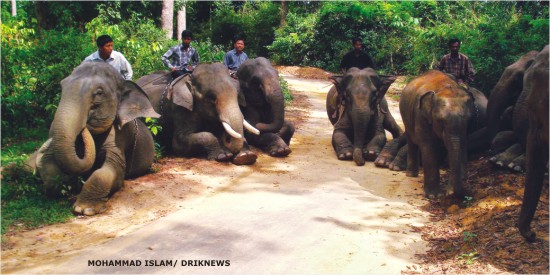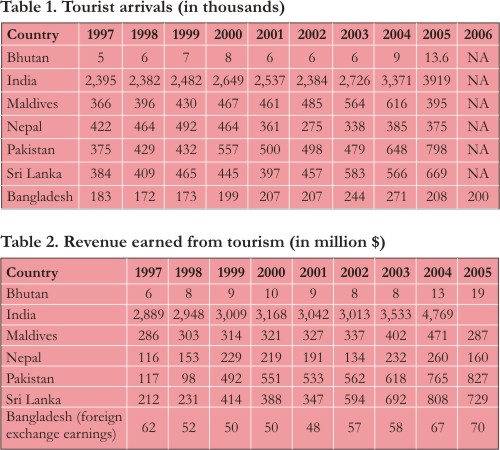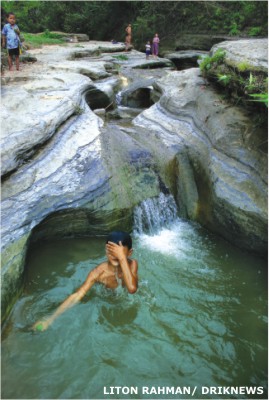
Inside
|
Responsible tourism
We may define responsible or sustainable tourism as that in which tourists make responsible choices when choosing their holidays. These choices reflect responsible attitudes to the limiting of the extent of the sociological and environmental impacts their holiday may cause.
In 2006, eco-tourism was redefined as a subset of sustainable tourism, differing in its focus on ecology. Eco-tourism is sustainable tourism that contributes actively to the conservation of natural and cultural heritage. In simple words, eco-tourism means that, whatever the type of tourism, one should not harm nature. For today's fast changing world, only eco-tourism can save nature from ever growing human population. Eco-tourism is the best way to practice any kind of tourism, whether it is wildlife tourism, adventure tourism, or heritage tourism. Eco-tourism, therefore, should: Eco-tourism is considered the fastest-growing market in the tourism industry, according to the World Tourism Organisation, with an annual growth rate of 5% worldwide, representing 6% of the world's gross domestic product and 11.4% of all consumer spending -- not a market to be taken lightly. Attention to ways of alleviating poverty through eco-tourism has been growing. Bangladesh should find a way of institutionalising the tourism industry's commitment to poverty alleviation through integrating social, environmental, and economic goals. The country has the potential to do that. Status of Bangladesh in global tourism In 2005, global travel and tourism generated an estimated $680 billion in expenditures (up from $463 billion in 2001). The number of arrivals was 842 million in 2006 (up from 806 million in 2005 and 688 million in 2001). Despite world recession, threats of terrorism, and social and political unrest, the tourism industry is booming. Although France ranks number one among the world's 10 top destinations with about 76 million arrivals, US earns most: about $82 billion. Americans also spend more on travel and tourism. They are interested even in space tourism. Immediately after independence, the government set up Bangladesh Parjatan Sangstha (Bangladesh Tourism Organisation), with a view to develop this industry. The organisation was renamed as Bangladesh Parjatan Corporation in 1973. The 2007 economic review of the corporation states: "The foremost objectives of the corporation are to promote tourism in Bangladesh, build up positive image of the country abroad, elevate infrastructure at tourism sites, provide services to the tourists and develop tourist resources that exist in Bangladesh, creating employment opportunity in different sectors of this industry which is helpful to alleviate poverty." I am not sure how the corporation will achieve its cherished objectives, as its profit margin decreases every year. Its 2007 economic review shows that it made a profit of Taka 115 million during 1996-2001. The figure came down to Taka 55 million during 2001-2006, although Table 1 shows that the tourist arrivals increased during this period. In 2005, Bangladesh received 208,000 tourists, which is about 5% of what India received; it is 52%, 55%, 26% and 31% of what Maldives, Nepal, Pakistan, and Sri Lanka received respectively that year. In 2004, Bangladesh earned about $67 million (Table 2) as foreign exchange earnings from tourists (those who came with tourist visa, not necessarily that they spent their money on tourism alone), which is 1.4% of what India earned; it is 14%, 26%, 9%, and 8% of what Maldives, Nepal, Pakistan, and Sri Lanka earned respectively in that year. This clearly shows that Bangladesh remains far behind neighbouring countries, although it formulated a National Tourism Policy in 1992 where tourism was identified as an industry of due priority. The country's 1999 industrial policy identified tourism as a thrust sector! Today, there are about 150 private tour operators in the country, and 78 of them formed an association called TOAB (Tour Operators Association of Bangladesh) in 1992. No Bangladesh tour operator works abroad, and no foreign tour operators work in Bangladesh. TOAB claims that they cater to 95% of the tourists who arrive in the country. They also host most of the domestic tourists. However, they do not have any statistics on how many tourists they host every year, how big their private industry is, or what their contribution to the government treasury is.
TOAB feels that the National Tourism Policy 1992 has never been made effective. Although Bangladesh Parjatan Corporation and TOAB do not have effective cooperation at the moment, there is a feeling in both the organisations that there is much more they can do together. TOAB feels that Bangladesh's proximity to fast growing countries like India and China may allow it to share the benefits of their growth. Tourist attractions The museums, science museums, art and archeological museums, archeological sites, indigenous people, traditional food and song, and centres of pilgrimage attract tourists. Bangladesh has a huge market for herbal medicine, which could be an added attraction for the tourists. Bangladesh handicrafts, particularly rattan products, carpets, leather goods, brass, filigree and clay work, are the main shopping items of tourists. Our muslin cloth and jamdani are world famous.
The Sundarbans is not only the world's largest mangrove forest, it is also the last natural stronghold of the Royal Bengal tiger. The forest is the most popular tourist attraction in Bangladesh because of its natural beauty and tranquility and wildlife. Natural beauty, wildlife, and river cruises are the attractions of this tour. Constraints in tourism in Bangladesh
Recommendations
*Tourism should be integrated with all the national events, either cultural or religious. Let there be a calendar highlighting the events. Let there be a common website of the Parjatan Corporation and the private tour operators for facilitating dissemination of information on tourism in the country. *Let's make this year's World Responsible Tourism Day, November 14, a national event. Responsible Tourism Day, now an established date in the UN calendar, is a signal to the world that responsible tourism must now be top of the agenda. *E-tourism is one of the fastest-growing e-commerce sectors. It also increases hardware and software purchases. E-tourism is also important for a developing country like Bangladesh, because it could generate employment and foreign currency earnings. Parjatan Corporation and the private tour operators should take it up seriously. *Tourism should be included as a subject at primary, secondary and tertiary levels of education in the country. Serious research projects should be undertaken on responsible tourism. Wildlife Trust of Bangladesh will be glad to join in any such activities. *A National Responsible Tourism Award should be initiated immediately for those who make positive contributions to conservation and the economies of local communities while minimising the negative impacts of tourism. *Tourism is a publicity dependent industry. Bangladesh Parjatan Corporation and the TOAB Should prepare more dependable and attractive publicity items, including tour itinerary, for distribution. *The tourism industry in the country should have an effective marketing policy. Since tourism is a multi-dimensional activity, and basically a service industry, it is necessary that all the stakeholders become active partners in the endeavour to attain sustainable growth in tourism if Bangladesh is to become a world player in the tourist industry. Parjatan Corporation and the local tour operators are perhaps aware of the fact that tourism businesses express their commitment to community development and to social responsibility by giving donations, amongst other actions. In most cases, this type of action is carried out without any expectation of direct economic advantage, although in practice it can be used to improve economic gain. Tourism enterprises, such as hotels, which engage in such activities may be able to transform their commitment into image-improvement, which in turn results in economic value. We need to establish domestic tourism which is socially and psychologically acceptable, environmentally and ecologically sustainable, and economically viable. The benefits that are received from tourism should be fairly distributed, and then only will tourism be participatory, and, thus, the rights of local residents will be properly recognised, and tourism will be responsible and sustainable. Md. Anwarul Islam is Professor, Department of Zoology, University of Dhaka and Chief Executive, Wildlife Trust of Bangladesh. This article is based on the keynote paper presented by the author at the Bangladesh Travel & Tourism Fair 2007.
|
 The term "eco-tourism" was coined in 1983 and was initially used to describe nature-based travel to relatively undisturbed areas, with an emphasis on education. The concept has, however, developed into a scientifically based approach to the planning, management, and development of sustainable tourism products and activities.
The term "eco-tourism" was coined in 1983 and was initially used to describe nature-based travel to relatively undisturbed areas, with an emphasis on education. The concept has, however, developed into a scientifically based approach to the planning, management, and development of sustainable tourism products and activities. 


 *To boost tourism, the government should give this sector an Export House Status, like the garments industry. Incentives should be given to private investment in the tourism industry in the form of income tax exemptions, interest subsidy and reduced import duty. The hotel and tourism-related industry should be declared a high priority industry for foreign investment.
*To boost tourism, the government should give this sector an Export House Status, like the garments industry. Incentives should be given to private investment in the tourism industry in the form of income tax exemptions, interest subsidy and reduced import duty. The hotel and tourism-related industry should be declared a high priority industry for foreign investment.